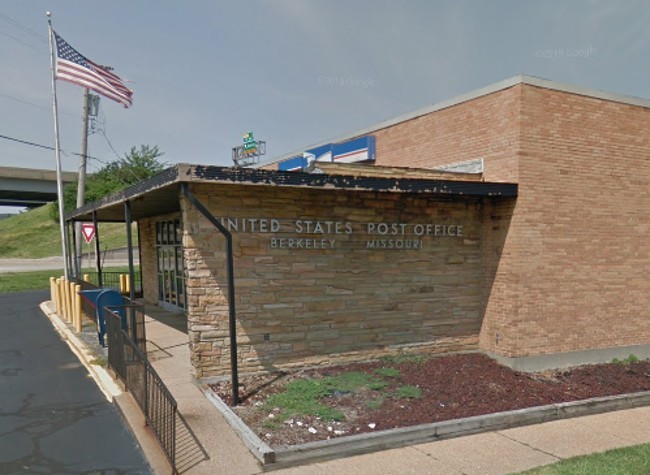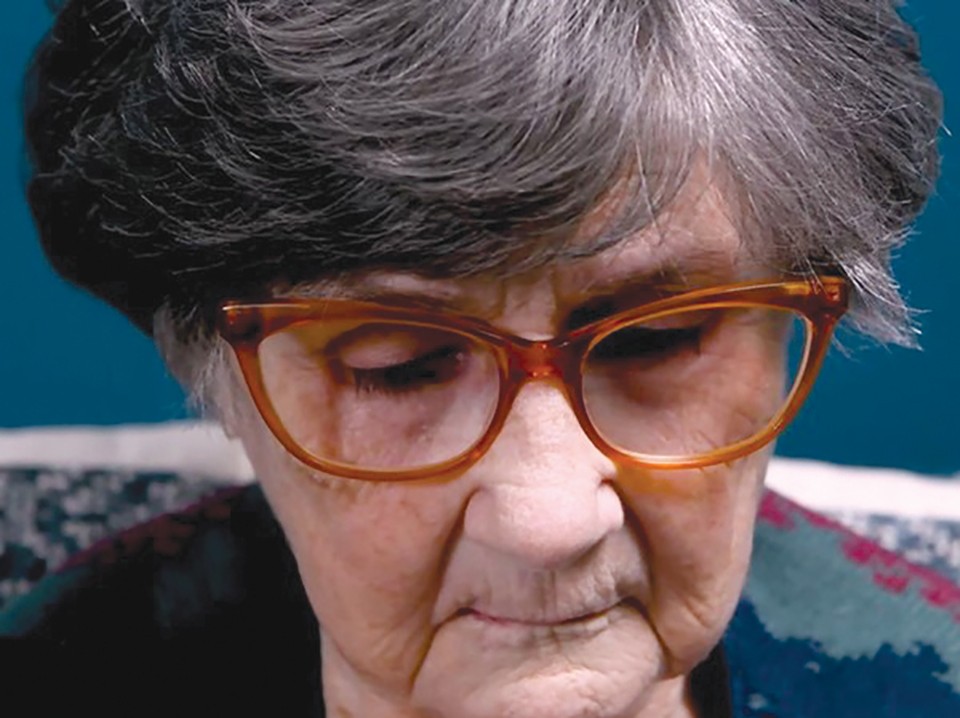For Julia Dunaway, it began with a message on Facebook from a man in uniform.
"Hello there thanks for adding me as a friend, tell me how are you doing?"
The 70-year-old living outside of Tupelo, Mississippi, saw no reason not to respond to the friendly message. They exchanged some pleasantries. He quickly proved to be one of the most intriguing men she'd ever encountered. He said he was United States Army General Stephen Townsend, currently stationed in Syria. Life in his desert outpost was difficult. He and his troops faced enemy bombardment. A fire broke out on his base. Men under his command died. Despite the duress he was under, the general was unfailingly polite in his messages. He began every post addressing her as "Madam" and ended every conversation with a Christian salutation — "I hope God allows you to have a wonderful day," or something similar.
After Dunaway and the general had gotten to know each other, he revealed to her his secret.
The general had helped a Syrian family get out of their war-torn homeland and to Canada. As a token of their gratitude, the family had told the general the location of a secret portfolio of diamonds and other riches worth $3 million, still in Syria, that he could keep for himself if he could get the valuables out of the country. The general just needed someone in the United States who could safely receive the diamonds as well as pay some of the customs and import fees. He said that if Dunaway helped pay those fees, she could keep half the portfolio for herself. This was a once-in-a-lifetime opportunity, the general said. How often are you able to help a high-ranking, highly decorated member of your country's military and get rich doing it?
Dunaway, who initially had been skeptical, asked the general how she could know for sure he was real. The general instructed Dunaway to type his name into Google.
The first result was a website for the United States Africa Command, with an official .mil address. The general was a man with salt-and-pepper hair standing in front of an American flag wearing a no-nonsense expression. If he weren't in uniform, he'd look like someone who would do a really good job filing your taxes.
"I've always been sympathetic to the military," Dunaway tells the RFT. Those sympathies, combined with the man's seemingly Christian values and his offer for a big payday, proved to be too much for Dunaway to resist.
The general put Dunaway in touch with a man he called "the diplomat." The diplomat told Dunaway his secretary worked out of an office in St. Louis and to mail the money there.
Dunaway is not a rich woman. She's been a house cleaner for the past 30 years. Before that, she worked at a jewelry store and in retail. After meeting the general and the diplomat, she became determined to do whatever she had to in order to get the $1.5 million they promised.
"I was going to give the money to my kids," Dunaway says. "My daughter and son-in-law had helped me over the past twenty years, and I wanted to give back to them. You start thinking about how you would love to do that for your kids, it just makes you foolish."
Her judgment clouded by the promise of riches, Dunaway mistook a story too good to be true for an opportunity too good to pass up and mailed $5,000 to St. Louis.
The P.O. Box in North St. Louis County
The money Dunaway sent to St. Louis arrived at a post office just across Interstate 170 from Lambert Airport in Berkeley. Needless to say, the address had nothing to do with a diplomat's secretary.
There is a real General Stephen Townsend, but his identity had been stolen by fraudsters in Nigeria.
The P.O. box in Berkeley had been opened by a woman identified in court documents as B.M., who was acting at the direction of north St. Louis County resident Trenice Hassel. According to a federal indictment, 43-year-old Bonmene Sibe of St. Louis paid Hassel $100 to find someone who would open P.O. boxes in their own name and not ask any questions. Authorities say Hassel chose B.M. because she was "vulnerable."
Sibe was himself working with 43-year-old Ovuoke Frank Ofikoro, a recently naturalized U.S. citizen who later said in court he was two semesters away from earning a bachelor's degree in information systems. Ofikoro instructed Sibe "to find individuals who would open [P.O.] boxes to be used to receive the proceeds of their scheme," according to court documents. At a hearing in July where Ofikoro pleaded guilty to mail and wire fraud, Assistant U.S. Attorney Tracy Berry described Ofikoro as a "manager or supervisor" in this scheme.
Ofikoro's attorney, Scott Rosenblum, declined to comment. Sibe's lawyer did not return a call from the RFT, and address searches for the two scammers revealed little. The owner of the south-city property associated by public records with Sibe said she had never heard of him. And a Jennings address most recently listed for Sibe in court records turned up an abandoned house with a car's bumper leaning against the door on the front porch. "No one has lived there in years," a neighbor said.
Ofikoro and Sibe's involvement in the scheme began in the spring of 2019 when the two men used proxies to set up the P.O. box in Berkeley and another in the Near North Riverfront neighborhood of St. Louis. Dunaway was first contacted by the fake general at about the same time.
Dunaway was hardly the only one mailing money to the two P.O. boxes. From the spring of 2019 to July 2020, dozens of senior citizens were bilked out of between $550,000 and $1.5 million as part of the scam.
A 71-year-old Tennessee woman mailed at least $15,000 to St. Louis, thinking the money was going to a diplomat named William Smith and would be used to fly Smith from a Syrian hospital to the U.S. in a "bomb proof" airplane.
A 71-year-old woman from New Mexico who fell for a story identical to the one used to dupe Dunaway mailed $160,000 to the Near North Riverfront P.O. box.
A 68-year-old Florida resident sent between $55,000 and $60,000 to the Berkeley P.O box after being contacted by "Diplomat Barry Jones."
A 71-year-old Illinois woman sent an unknown amount of cash after being instructed to do so by a supposed lieutenant general stationed in Syria who went by the name "Raymond Chandler."
The list of anonymous victims in the indictments goes on and on. In the first six months of 2020, Sibe and Ofikoro collected or attempted to collect 87 packages and pieces of mail sent by elderly victims from 25 states.
After Dunaway sent money to St. Louis for the first time, the diplomat said the portfolio would be mailed to her soon. In Mississippi, she paced her home nervously all day expecting the package. She didn't want to go to sleep at night for fear she would miss the delivery.
When the package didn't arrive, she messaged the general and the diplomat asking what had happened. The diplomat said there had been a delay, and the delay meant there would be further charges.
Dunaway says there were about a dozen days she anxiously awaited the delivery of her riches, only to be fed another excuse. The diplomat's secretary had made a mistake or the package was tied up in customs. For every problem, Dunaway was asked to come up with more money.
She ended up withdrawing $14,000 in credit-card cash advances, taking out a $3,000 loan from one bank and a smaller loan from another. Anticipating the fortune was almost within her grasp, Dunaway bought a lock box and sent photos of it to the diplomat and the general so they would know the diamonds and cash would be safe in her possession.
In 2020, a payment she sent to St. Louis caught the attention of U.S. Postal Service investigators here, who alerted Dunaway that there were no military men, and there was no diplomat or portfolio of diamonds.
"My first thought was that he was talking about somebody else," Dunaway says. "Because I never thought that I was being lied to."
However, Dunaway adds, "It didn't take me long to change my mind."
Of the more than 25 victims of the scam involving the St. Louis P.O. boxes, Dunaway is actually an outlier. She was motivated to send money by the promise of a once-in-a-lifetime windfall.
For most victims, the motivation is different. It's love.
Romance Scams and Money Mules
J.T., a 76-year-old living in Utah, said in a victim impact statement that she fell in love with Lieutenant General William Garrett stationed in Iraq. Garrett asked J.T. where she wanted to live with him when he returned from duty, and J.T. said that she wanted to live with Garrett in California. (There is a real Lieutenant General William Garrett, but he was not the one exchanging messages with J.T.)
Garrett told J.T. he had found the perfect place for the two of them, a house in Riverside on the market for $313,000.
Not entirely trusting the lieutenant general, J.T. instructed her nephew who lived relatively close to the property to take a look at it. After her nephew did so, J.T. began sending money to a realtor, whose name was B.M. — the same person whose identity had been used to open the P.O. box in Berkeley.
"He sent me beautiful text messages every day," J.T. wrote. "I really thought he loved me. But obviously he was using me."
Garrett talked J.T. into buying him a cellphone by claiming his troops were in a fight with the Iraqi army and they lost their phones. J.T. did as instructed and sent the phone to B.M. in St. Louis. At one point, J.T. sent money for a plane ticket so Garrett's son could visit her in Utah. To pay for the ticket she had to spend the money she would have otherwise used for food. After the money was sent, Garrett messaged J.T. to say his son had been hit by a car and would not be flying to Utah.
J.T.'s statement is filled with just as much loss as anger, as if writing about a relationship that she wished had worked out. J.T. said it "broke [her] heart" when Garrett stopped messaging.
According to the FBI, a romance scam is carried out by a criminal who "adopts a fake online identity to gain a victim's affection and trust."
The indictment of Ofikoro and Sibe states that, as part of their scheme, "conspirators groomed the women by promising to marry them, and addressing the women as 'Wife' and 'Wifey.' The women believed they were working with their romantic interests to build a future together."
Romance scam fraudsters target "individuals looking for love and companionship," according to the FBI. "They spend hours honing their skills and sometimes keep journals on their victims to better understand how to manipulate and exploit them. The scammers often watch social media accounts or glean information from an online dating profile."
Scams like the one Sibe and Ofikoro participated in are run out of a number of different countries, though they have become something of a cottage industry in Nigeria. A "419 scam" is an umbrella term for this type of fraud, named for the section of Nigeria's criminal code outlawing it. The romance scam is an update on the well-known Nigerian prince scam, in which the victim is contacted by a person claiming to be Nigerian prince who has come into a large inheritance but needs a small loan to pay the fees in order to get the money. A person who truly believes they are sending money to would-be Nigerian royalty would have little compunction about sending money or valuables to Nigeria. However, when romance scams evolved to include fake generals in Syria, the logistics became a little more complicated. The money was still ultimately headed to Nigeria, but asking a victim to send a package or a wire transfer to the African nation for a supposed American soldier in the Middle East would almost certainly give victims pause.
That is where what the FBI calls "money mules" come in. A money mule is "someone who transfers or moves illegally acquired money on behalf of someone else."
Assistant U.S. Attorney Tracy Berry prosecuted Sibe and Ofikoro. She says fraudsters "rely upon United States citizens, or individuals who are residing in the United States, to move the money because their victims would be a lot more apprehensive and reluctant to send money to an address in Nigeria than they would an address in Missouri."
The money Dunaway and others mailed to St. Louis wasn't staying here. According to the Justice Department, Ofikoro transferred some of the money to a bank in Nigeria.
Online scams are nothing new. According to CNBC, before the pandemic the Nigerian prince version of the scam was bilking people out of $900,000 a year. But amid the increased social isolation and mental-health pressures brought upon by COVID-19, the FBI says the online fraud industry has boomed. Officials said at a press conference in December in St. Louis that during a typical month in the Eastern District of Missouri, the FBI receives about 300 complaints related to online scams. These 300 monthly complaints total an average of $2.4 million in losses, or $8,000 per victim.
On April 8, 2020, the U.S. Postal Inspection Service learned of the romance scam operating out of Berkeley. Berry couldn't discuss how they uncovered this specific fraud ring but said they generally come to the attention of law enforcement thanks to diligent postal employees, family members of victims and even victims themselves.
Arrest warrants were issued for Sibe and Ofikoro in August of that year. When Sibe was apprehended, he had in his possession electronic images of mail from elderly victims who lived in Georgia and Tennessee. He also had a package from Dunaway. Ofikoro was arrested in Chicago as he was headed out of the country. Hassel was arrested in September 2020 in St. Louis.
At a hearing in July 2021 when Ofikoro pleaded guilty, the judge stated that Ofikoro could potentially lose his citizenship because in his application he signed a form saying he had committed no crimes while in the U.S.
When Sibe pleaded guilty in December, he signed a plea agreement saying that he was ignorant to the wider scheme and "despite the high probability that the money was proceeds of a fraud scheme, [Sibe] deliberately avoided learning the truth."
Ofikoro could face as many as nine years in jail. His sentencing is scheduled for March. Sibe is set to be sentenced sometime after February 28.
A woman identified only as C.H. in court documents was much more succinct in her victim impact letter to the court than J.T from Utah was. A widow who lives on social security and a small pension, C.H. said the thief "dwindled [her] savings account down to nothing. These guys need to be put away for a long time. They are the trash of the earth."
Both Victim and Accomplice
Two months after arresting Sibe, Ofikoro and Hassel, the Justice Department indicted Ohio woman Linda Matson in connection with the scheme.
If Dunaway is a textbook scam victim and the men pretending to be "Diplomat Barry Jones" and "General Will Smith" textbook scammers, Matson falls somewhere in between.
The 61-year-old's story began very similarly to Dunaway's.
In early 2020, Matson was contacted online by someone who had stolen the identity of a United States Army general. "General J.D." told Matson that he needed funds to recover a portfolio he claimed was worth $20 million.
At the direction of the general, Matson mailed about $300,000 to the Berkeley P.O. box. over the course of several months.
In May of that year, federal authorities contacted Matson in Ohio and told her she was the victim of a romance scam and that the real military general whose identity had been stolen was in fact "not the beneficiary of the funds she was mailing to St. Louis, Missouri."
Matson told authorities she would stop sending money to St. Louis and even sent the inspectors a series of links to episodes of Dr. Phil's show in which the popular daytime TV host covered the topic of romance scams, according to prosecutors with the U.S. Attorney's Office.
"Matson was correct in referencing Dr. Phil episodes," Berry says. "Because he's had numerous women and men on who have been catfished and who have sent money and who have been confronted with the truth ... and they just continue."
The feds say that three days after sending those links to inspectors, Matson fell back under the sway of the imposter general.
That's when the case took a bizarre turn. In the eyes of investigators, Matson began to transition from victim in the scheme to accomplice. Over the next three months, she and others persuaded three people to loan her nearly $600,000 to "secure General J.D.'s portfolio from the United States Customs Service; pay taxes and fees associated with her winning the Mexican lottery; and finance General J.D.'s return from a military assignment overseas," according to the indictment.
Prosecutors say Matson also contacted Postal Service inspectors and said she needed to expedite the return of money she had sent to St. Louis that had been seized by authorities when they first revealed to her that she was a victim of a romance scam. She needed the money back soon, she said, because her niece had gone missing. In fact, the indictment says, Matson intended to use the money to "further her relationship with the individual she believed to be General J.D."
Prosecutors say Matson told some of the victims that she had met the general in person and he had a portfolio worth many millions of dollars. A Dayton man received text messages from someone claiming to be the general, stating that if he loaned J.D. $50,000, he could double his money in two weeks. The text messages originated from Matson's phone. Finally, Matson also instructed another individual to transfer $125,000 from their Florida bank account so she could forward it on to the general.
The allegations appear to show Matson falling more fully under the scammers' control, but to federal authorities, she had crossed a line and was now victimizing others.
Matson was arraigned in court in Missouri in December and pleaded not guilty.

Matson's progression from a person being scammed to a person doing the scamming is not as unusual as it may seem. Her case is very similar to that of 81-year-old Kirkwood woman Glenda Seim.
At some point prior to 2014, Seim was contacted by a man online who claimed to be a United States citizen conducting business in Nigeria. He told her that his business partners and members of the Nigerian government prevented him from leaving the country until he paid unspecified "fees, taxes, or penalties."
In 2014, Seim received wire transfers from people she didn't know and then transferred the money to Nigeria. She was alerted by Moneygram employees that she was a victim of an internet scam, but she didn't listen to their warnings or subsequent warnings from FBI agents. She says now that she only listened to "the love of my life."
Like Matson, federal authorities say that Seim was persuaded to transition from victim to accomplice, opening at least eight bank accounts which were used to receive ill-gotten funds. These accounts became destinations for money transfers from other accounts belonging to victims who had their banking information stolen. Accounts opened by Seim also received fraudulent unemployment benefits and Small Business Association COVID-19 relief loans.
In 2017, at the behest of Seim's online love, she registered a business with the Missouri secretary of state and later opened bank accounts in the name of that company.
In May 2020, law enforcement met with Seim and alerted her that she was committing bank fraud. She signed a document stating that she understood her behavior was illegal and that if she continued to carry on with it she could be subject to prosecution.
Berry says that at this point, the fraudsters tell individuals like Seim, "No, baby. No, baby, this is all real. And I'm going to help you get your money back."
Three months later, Seim attempted to deposit a check for $100,000 into her business account.
Instead of another warning, authorities arrested the 81-year-old. Seim pleaded guilty in November and will be sentenced in February.
It is hard to know what sort of punishment individuals like Matson, if she is found guilty, and Seim may face. They're accused of acting as accomplices, pulled so deeply into the scam by fraudsters that they helped victimize others. The case of Trenice Hassel, the woman paid $100 by Bonmene Sibe to find someone to open a P.O. box, may provide a clue to the fates of those in this difficult gray area.
When Hassel was sentenced in April, her defense asked the judge for time served plus supervised release, and the prosecutor Berry agreed. "There is a lot of restitution owed in this case but Mrs. Hassel is not being held responsible for any actual loss," Berry stated at the hearing.
'A Desperation Play'
In December, the FBI, the Secret Service, U.S. Attorney's Office and the U.S. Postal Inspection Service announced they were collaborating on a public education campaign to try to increase awareness of online fraudsters recruiting U.S. citizens to become money mules. The federal agencies chose Glenda Seim to be the face of their initiative, even as her prosecution continued its ways through the courts.
At a press conference in December, the federal agencies debuted a video featuring Seim. In it, she is shown wearing a cardigan and glasses, typing at her computer. In narration, she says that in 2014 she met online a businessman whom she believed she was in love with. She recounts the escalating crimes she committed at his request and the warnings she ignored from friends and family and law enforcement. In the video, she is shown counting cash to send him as well as handling electronics she says in voice-over her "love" sent to her to pawn.
"I didn't listen to anyone else but my love," Seim says. "The love I have never seen or spoken to."
Seim closes the video by saying that after pleading guilty to two felonies last month, she'll "be listening to the judge now" at her sentencing.
At the press conference debuting the video, Berry, the prosecutor in the Sibe and Ofikoro cases, said that the public relations campaign is "basically a desperation play. We have been facing on a routine basis people who are continuing their criminal activity [after being warned by law enforcement]. They ignore when these law enforcement officers go to their door with their badges. They ignore everything that has been said to please the person that they have never seen."
A report issued by the Federal Trade Commission in October stated that people older than 60 had been swindled out of $139 million via romance scams in 2020, an increase from $84 million the year before.
Though the FTC hasn't released figures for 2021, the losses are likely to be even higher. In 2020, the agency received 5,169 reports of seniors being targeted by fraudsters on social media. The reports increased to 5,998 in the first half of 2021 alone.
The statistics include a lot of people like Dunaway who are left to pick up the pieces after they realize their chance to strike it rich — or the love of their life — was nothing but a hoax.
Dunaway says retirement for her is now years away. She's spent the past year and a half putting her life back together, repaying the money she borrowed and the cash advances she took out on her credit card. At 70 years old, she says she's never worked harder or cleaned more houses than she has in the past year. Thanks to all the hard work, she was recently able to pay back the last of what she owed the credit-card company.
"It was either end my life because of being so distraught or put one foot in front of the other and dig myself out of the mess," she says.
As for the men in St. Louis who helped perpetrate the scam, Dunaway says, "A lot of us are going to have repercussions for a long time. They ought to have repercussions, too."
We welcome tips and feedback. Email the author at [email protected] Follow him on Twitter @RyanWKrull









